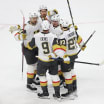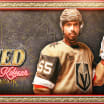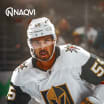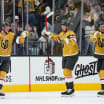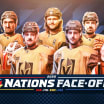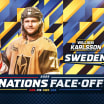It was the end of my first season coaching the Washington Capitals. We weren't very good. We came in last place.
I came in there and the team had struggled before I got there. I think they played 35-40 games and won maybe once. When I got there, Mr. Pollin, who owned the team, told me he mainly wanted us to be a hard-working team. Where even if we didn't win much, he wanted us to be tough as hell to play against.
We weren't going to be the Montreal Canadiens or the Boston Bruins. But boy did we work hard.
Although we didn't win much after I got there, they appreciated the hard work there in Washington. At the end of my first season, they had a big jamboree in the parking lot at the Capital Centre.
We hadn't won much, but we were competitive, so we had this big ole' jamboree in the parking lot and Mr. Pollin was there. We were up on stage and the crowd was screaming my name. Chanting my name.
"We love you, coach."
I had been with a lot of hockey teams, both as a player and a coach. It wasn't until I coached the new Washington Capitals that I had a crowd chant for me like this.
The crowd was chanting my name at the end of a season where we came in last place.
I look over at Mr. Pollin and he was clapping, too.
Mr. Pollin mouthed over to me: "I love you also, coach."
Me being a clown, I said: "Will you still love me, Mr. Pollin, when we don't make the playoffs again next year?"
He said: "sure, I'll miss you, too."
My Expansion Story: Tom McVie
An early-years coach of the Washington Capitals, Winnipeg Jets and New Jersey Devils, Tom McVie shares his personal NHL expansion story
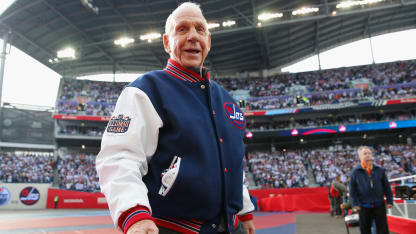
© Jeff Vinnick/Getty Images
* * * *
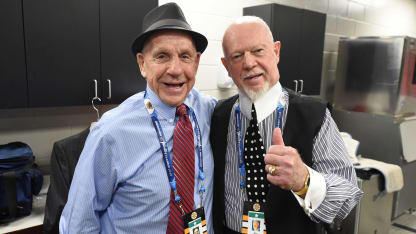
© Steve Babineau/Getty Images
When people look back on some of the teams I coached, no we didn't win many games.
We didn't win many games when I coached the Washington Capitals, we didn't win many games when I coached the Winnipeg Jets, we didn't win many games when I coached the New Jersey Devils.
It was a different time back then, though. It wasn't how it is now. With some of the guys out there in Las Vegas, that team has a chance to be good. The rules are different than how it was for us back then.
Say you and I were running a team. We wouldn't want our good players or young players leaving our franchise. Other teams thought that way then. It was a challenge to build a team from scratch then with what other teams gave you.
For me, the task was to be competitive.
Even though my teams didn't win many games, I'm proud of how competitive we were.
It was like bootcamp when I went in there. It was as if I was training 50 marines and getting them ready. Because you know, talent wins, skill wins, when they're working hard. We didn't have the talent or skill, but I had a plan. No team was going to go into our building, or even when we went on the road, and outwork our team.
They might win, but they're going to go to the dressing room saying "man, I'm glad that's over with."
During our summer training, I wouldn't let up. I kept calling the players every week. I had them on endurance training. People used to criticize me for the things I was doing. Back then, people thought lifting weights would make you muscle bound. Crazy. Now every team in sports does it. Circuit training.
As I said, we might not win many games, but nobody would outwork us. We could beat anyone in the mile run.
And you know what?
We won 24 hockey games that next year. We were still a long way from the playoffs. But we won only 11 games and eight games the two years before that.
It's funny, I forget my phone number, but I remember those games. All of the goals. We had 62 points. 62 points was an accomplishment. We finished ahead of the Detroit Red Wings.
And you know what, we still weren't very good the next year, either. Although we tied the Montreal Canadiens. They only lost eight or nine games all year, and we tied them 4-4. I'll never forget it.
Scotty Bowman was their coach and he even said it was a good hockey game. For us, that was our Stanley Cup.
Even if we never made the playoffs, it was still important that we were doing things the right way, even if sometimes the losses got to us in ways I can't really explain to you if you weren't part of it.
I was so fired up this one night we got really smoked that I drove the 20 minutes home and I forgot my son, Dallas, at the Capital Centre. He was the stick boy, and an outstanding young man. I was so fired up it hadn't even crossed my mind.
My oldest son is Tommy Jr., named for me. My other sons I named after cities I played in - Dallas and Denver. My wife always said: "thank God I never played in Albuquerque."
But as I say, even when you're working hard, the losses still got to you in ways like that, even when you could see the team getting a little better.
I was happy there.
We even bought a house and my family all moved in there. The problem was we got off to a sluggish start the next year and Mr. Pollin called me in and told me that was it for me.
!
That was hard.
Even when you sometimes get frustrated, I wanted to be the guy that got the Washington Capitals to the playoffs for the first time.
That didn't happen.
They were doormats for many years, not how they are now. They got to the playoffs a few years later, but I wasn't there for it. By that time I was in Winnipeg.
I was out of a job for quite a while there. I've been in hockey all my life and not working was rough on me.
Finally, John Ferguson calls me up and brings me to the Winnipeg Jets. They were still in the World Hockey Association then, which wasn't the NHL. And boy were they struggling when I got there. It was right near the end of the season in '78-79.
It wasn't the National League. The team was struggling, but we had some talent there. We had guys like Lars-Erik Sjoberg, Kent Nilsson, Willy Lindstrom. These guys could all play. If we could've brought that exact team into the NHL, I think we could've competed for a playoff spot.
It was a real good group there in Winnipeg.
We finished way back in the standings, but in the playoffs, we smoked the Quebec Nordiques. Just smoked them. And then we beat Edmonton, which of course had Wayne Gretzky, although he was just a young guy then.
We went on to win the whole Avco Cup championship that year.
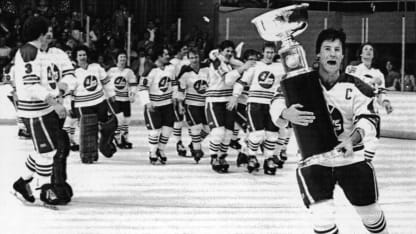
© B Bennett/Getty Images
Then we were brought into the National League. Us, Quebec, Edmonton and Hartford. We were brought into the NHL, and we were gutted.
All the players we had to return to the clubs that owned their rights in the National League. It was like robbing the cupboard.
I leave Washington, and that first bit in Winnipeg, we won a championship. Then I'm back starting from the beginning with the Winnipeg Jets when they go into the National League.
The people in Winnipeg really got on us. That team just couldn't win. I remember I used to do a radio call-in show and the fans would call in to try to win tickets.
First prize was two tickets, second prize was four tickets. That's the kind of team we had.
They had great fans, though. They were hard on you, but they knew the game.
For us to build our team was almost like building a house. Or fixing up a great big old house that needed a lot of work.
What you've got to do if you want to have a beautiful home, you've got to tear all the junk out of there, level the thing and get down to the foundation. You level it down to the foundation and build your house out on top of that. It's the same thing with a hockey team. The crew in Las Vegas won't have to go through it the same way teams did back then.
If you build right, like a house, your team can have a foundation that lasts 100 years.
In Winnipeg, it took a while because before we could get players to build a winning team, we had to move the veteran players with existing contracts.
This takes time.
The way to start this is by building the right culture. With me, I was never book smart. But when I walked in a dressing room, I knew what was going on.
Especially with a new team, you can't have guys with bad attitudes. You know, some of the veterans back then, it was as if they didn't want the team to get any better. Because if the team got better, they'd be gone.
Coaching expansion teams, it was my job to find those guys and get them out. Have the atmosphere where even if you're not the most talented team, you do things right.
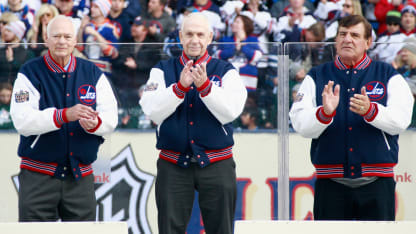
© Jeff Vinnick/Getty Images
When I coached in the New Jersey Devils organization, I coached George McPhee, you know. He was the kind of guy you need. If I was walking down a dark alley, George McPhee's the kind of guy I'd want walking beside me. Las Vegas is in good hands.
I say that as a fella that coached three expansion teams. Although I've often said it's a good thing I can still even carry on a conversation after coaching three expansion teams, I've been there.
As someone who's coached three expansion teams, I think I know what they need to make good.
George McPhee, Vaughn Karpan, Kelly Kisio - I know all those guys. Las Vegas should be better than any of the expansion teams I coached.
Sometimes I'm asked about my career and the teams I coached. You know, if I would do it all over again. When I think about it, I am one of the only fellas where if I got another job coaching an NHL team, I could win every game for 10 years and still wouldn't have a .500 record.
Although whenever I'm asked, it makes me think of father. He was a great man.
We came from a real small mining town in British Columbia. My dad worked as a smelterman in a furnace room. This was during World War II, and it was all guarded, because they made all the bullets for all the guns.
One time, I'll never forget this, my dad had to work a double shift because there were no unions back then. He had to work straight through the night and the next day.
Our family didn't even have a phone - we were that poor. My dad called one of my mom's friends that had a phone. I was told my dad needed another lunch because he was going to be working all night. I was about 10, and I had to bring him his lunch.
My mother handed me his lunch pail and I had to walk through the whole town to bring him his lunch. His lunch pail was heavy, too. I had to keep switching hands with it, it was so heavy. When I got to the factory, there were these stairs, and I'm not kidding you, it was probably a half a mile straight up these stairs to where my dad worked.
When I got to the top, there was a guard, because it was during the war. The guard scared me.
I told him my father was working and I had to bring him his lunch. This was a small town, so the guard knew who I was. Everybody knew everybody. But the guard tells me, go in there, you give your dad the bucket and you get the hell out of here.
I said: "yes, sir."
So I go in there and all of the furnaces are burning with flames, and boy is it hot. Then a guy with one of those big Asbestos suits and a mask started walking towards me. I didn't know it was my father. I didn't really understand what he did for a living.
I see this guy in this big suit walking towards me, and I just dropped the lunch pail and I ran. It was my dad and I didn't know. I was frightened.
A little while later, my dad sits me down, and calls me "son" because he was a Scotsman and that's how he talked. He said: "son, I don't think you're going to get an education. Because the school is always calling us looking for you and they can never find you."
And he said: "another thing, you don't want to work where I work. Because you come up there one time, you drop my lunch pail and you broke my thermos and ran.
"What you've got to do, son, is try to find something you love to do and talk someone into paying you for it."
I've been working in pro hockey for 61 years. I've been going to the rink since I was seven or eight years old and I go to the rink now. I'm still working for the Boston Bruins. I'm still fired up.
!
I've been in hockey all my life. I've never had a realjob.
Sometimes I do think back. I remember Tommy Ivan, back in 1974 or '75, was scouting the teams I coached in Dayton, Ohio. I think he was thinking of bringing me to work for the Chicago Blackhawks. They hadn't won in a while, but they had good players. I wonder sometimes how it would've been different if I coached there. If I coached a team with a real chance to win.
But I coached three expansion teams instead.
A friend of mine likes to joke that I'm like Jack Nicholson in One Flew Over A Cuckoo's Nest. Or the guy in the movie that dances around the room.
Because no other fella would go into coaching three expansion teams.
But you know, that's something that makes me proud.





